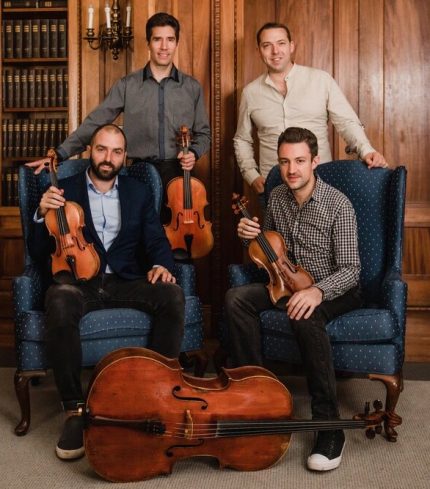Escher Quartet’s Debussy makes time stand still in CMS program

The concert presented by the Chamber Music Society of Lincoln Center Monday night at the Harris Theater offered a sampler of what they do best, with a well-balanced program of familiar works and worthy rarities.
A pair of cornerstone works commingled gracefully with two items by Czech composers, which opened the evening.
The Josef Suk renaissance remains overdue but CMS did their part with his Elegie. This miniature is entirely characteristic, painting a sweet-sad vein of lush Romantic expression. Performed in the trio version by violinist Adam Barnett-Hart, cellist Jan Vogler and pianist Juho Pohjonen, the musicians gave Suk’s music affecting advocacy, highlighted by Barnett-Hart’s refined tone and hushed, sensitive phrasing.
Leoš Janáček’s two string quartets are semi-regular concert-hall visitors. Less so his Violin Sonata, completed—after a tortuous seven-year gestation—in 1921, and his sole work in the genre.
Barnett-Hart and Pohjonen had the full measure of this strange, unsettling work. The violinist brought a vernal freshness to the songful theme of the Ballade yet both emphasized the when-worlds-collide qualities. The jagged ensuing piano part almost seems at war with the pensive inward qualities of the violin, and both players brought out the fantasy element of this enigmatic music with polish and dedication.
Debussy’s String Quartet closed the first half. It’s not many ensembles that can bring something new to so familiar a piece as this. But the Escher Quartet made Debussy’s groundbreaking 1893 Op. 10 seem both freshly minted and remarkably modern.
The great chamber groups perform a kind of real-time alchemy that makes you think each work they perform is the one uniquely suited to their talents. Such was the case here with the illusion that there was no intermediary between the score itself and the fresh performance by violinists Barnett-Hart and Brendan Speltz, violist Pierre Lapointe and cellist Brook Speltz
Barnett-Hart’s pure, silvery timbre, especially, seemed tailor-made for this score. The buoyant nervy animation of the outer movements was surely conveyed, and the Assez vif thrown off with a clarity and precision rarely encountered.
The highlight of the Debussy performance—and of the evening—was the Andantino. The Escher players seemed to make time stand still, effortlessly distilling the essence of this introspective music with expressive warmth and a natural confiding intimacy.
The largest work on the program was Brahms’ Piano Quartet No. 2 in A major—the middle of the composer’s three works in the genre and the most epic in scale.
Such repertorial cornerstones are usually in safe hands with CMS’s excellent players—here Pohjonen, violinist Danbi Um, violist Richard O’Neill and Vogler. But, oddly, the Brahms received the least satisfying performance of the evening.
There were worthy elements to be sure: Pohjonen’s incisive keyboard work, a vigorous if unsmiling Scherzo and the belated fire and urgency all four players brought to the closing section of the finale.
But for the most part, this was a generic and sorely undercharacterized reading that felt more like a promising public rehearsal than a finished performance. The string playing was polished yet faceless, lacking in weight and expressive profile, with dynamics unmarked and key thematic contrasts unexplored.
The prevailing lightness of being was most glaring in the Poco adagio, which began in an offhand manner and remained there, the superficial traversal leaving the slow movement’s deep vein of feeling wholly unplumbed. No one hearing this music for the first time would ever guess that this is one of Brahms’ richest lyrical outpourings.
At the top of the evening, after the cell phone announcement there was a surreal five-minute spoken PSA extolling the virtues and contributions of the Native American tribes of Chicago and Illinois. What this had to do with the evening’s performance—or anything else—is anyone’s guess.
Violinist Michael Barenboim performs with the West-East Divan Ensemble 7:30 p.m. February 19 at the Harris Theater. harristheaterchicago.org
Posted in Performances



